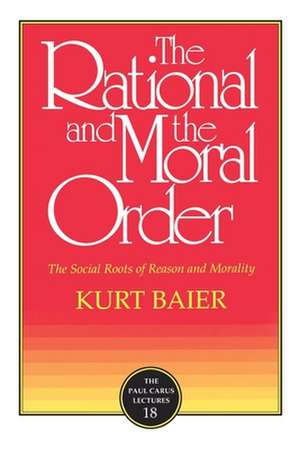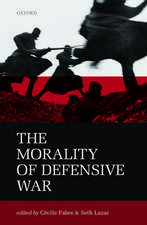The Rational and the Moral Order: Paul Carus Lectures, cartea 0018
Autor Kurt Baieren Limba Engleză Paperback – 31 aug 2003
Just as the giving of reasons is a social enterprise taught to succeeding generations, so too is the moral enterprise, for a moral order is a social order of some sort. It is a social order that encourages a critical stance toward, and permits the correction of, its mores. Moral precepts can be sound or unsound, and yet can be relative to a moral order.
In the concluding chapter Baier shows how his theoretical framework can be used to confront some of the moral problems people face, problems which have also exercised contemporary philosophers. Though there are many philosophers who believe that killing is worse than letting anyone die, there are few that defend the view other than by raw intuition. Baier deploys the resources of his theory of morality in support of this widely shared but poorly defended viewpoints.
"Along the way, Baier deals with virtually all the problems that have taxed moral philosophers for a very long time -- rationality, responsibility, morality's relation to law, the good life, prisoner's dilemma, moral motivation, and others. The Rational and the Moral Order is careful, insightful, and convincing." --Theodore M. Benditt, University of Alabama
Preț: 296.51 lei
Nou
Puncte Express: 445
Preț estimativ în valută:
56.74€ • 59.02$ • 46.85£
56.74€ • 59.02$ • 46.85£
Carte tipărită la comandă
Livrare economică 14-28 aprilie
Preluare comenzi: 021 569.72.76
Specificații
ISBN-13: 9780812692648
ISBN-10: 0812692640
Pagini: 468
Dimensiuni: 154 x 232 x 30 mm
Greutate: 0.69 kg
Editura: Open Court Publishing Company
Seriile Paul Carus Lectures, Paul Carus Lectures
Locul publicării:United States
ISBN-10: 0812692640
Pagini: 468
Dimensiuni: 154 x 232 x 30 mm
Greutate: 0.69 kg
Editura: Open Court Publishing Company
Seriile Paul Carus Lectures, Paul Carus Lectures
Locul publicării:United States
Descriere
'The Rational and the Moral Order' is a significant book providing a comprehensive theory of morality. The opening chapter is simply marvellous. Baier provides a cogent response to Hume's conundrums on practical reasoning: logical entailment, he argues, is not the correct model of the relation between reasons and that for which they are reasons. Indeed, the giving of reasons is, in part, a social enterprise, and there is no necessary connection between rationality and self-interest.
Just as the giving of reasons is a social enterprise taught to succeeding generations, so too is the moral enterprise, for a moral order is a social order of some sort. It is a social order that encourages a critical stance toward, and permits the correction of, its mores. Moral precepts can be sound or unsound, and yet can be relative to a moral order.
In the concluding chapter Baier shows how his theoretical framework can be used to confront some of the moral problems people face, problems which have also exercised contemporary philosophers. Though there are many philosophers who believe that killing is worse than letting anyone die, there are few that defend the view other than by raw intuition. Baier deploys the resources of his theory of morality in support of this widely shared but poorly defended viewpoints.
"Along the way, Baier deals with virtually all the problems that have taxed moral philosophers for a very long time -- rationality, responsibility, morality's relation to law, the good life, prisoner's dilemma, moral motivation, and others. The Rational and the Moral Order is careful, insightful, and convincing." --Theodore M. Benditt, University of Alabama
Just as the giving of reasons is a social enterprise taught to succeeding generations, so too is the moral enterprise, for a moral order is a social order of some sort. It is a social order that encourages a critical stance toward, and permits the correction of, its mores. Moral precepts can be sound or unsound, and yet can be relative to a moral order.
In the concluding chapter Baier shows how his theoretical framework can be used to confront some of the moral problems people face, problems which have also exercised contemporary philosophers. Though there are many philosophers who believe that killing is worse than letting anyone die, there are few that defend the view other than by raw intuition. Baier deploys the resources of his theory of morality in support of this widely shared but poorly defended viewpoints.
"Along the way, Baier deals with virtually all the problems that have taxed moral philosophers for a very long time -- rationality, responsibility, morality's relation to law, the good life, prisoner's dilemma, moral motivation, and others. The Rational and the Moral Order is careful, insightful, and convincing." --Theodore M. Benditt, University of Alabama





















